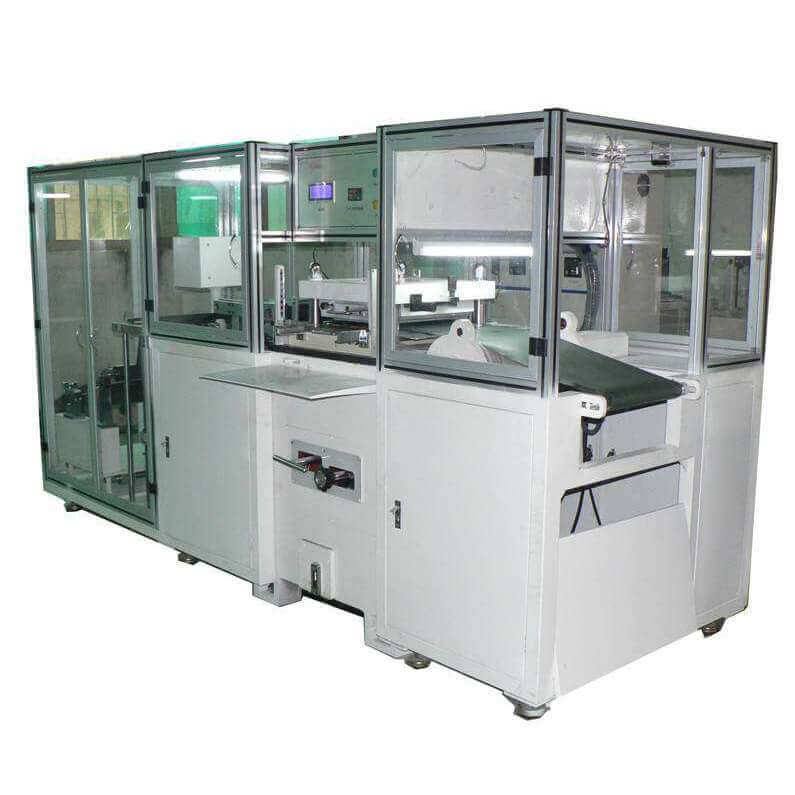مدونة الموقع
اتصل بنا
- إذا كانت لديك أسئلة، يرجى الاتصال بنا، وسيتم الرد على جميع الأسئلة
- البريد الإلكتروني : David@tmaxcn.com
- البريد الإلكتروني : Davidtmaxcn@gmail.com
- إضافة : No. 39, Xinchang Road, Xinyang, Haicang Dist., Xiamen, Fujian, China (Mainland)
المنتجات الساخنة
آلة مختبر بطارية الليثيوم
EV Car battery manufacturing plant
August 22,2023.
The key machinery and technologies involved in an EV car battery manufacturing plant include:
Battery Assembly Line: The battery assembly line is the core of battery component manufacturing. It includes mechanical devices for assembling battery cells, modules, and packs. These assembly lines need to be highly automated to enhance production efficiency and quality.
Battery Cell Assembly Equipment: Battery cell assembly equipment is used to assemble the fundamental unit of a battery, typically a lithium-ion battery cell. These devices involve the stacking and encapsulation of electrode sheets, separators, and electrolytes.
Battery Module Assembly Equipment: Battery modules are components of battery packs and often contain multiple battery cells. Battery module assembly equipment is used to assemble multiple cells into modules and ensure their connectivity and insulation.
Battery Pack Assembly Equipment: Battery packs are the final assembly of a battery system, containing battery modules, control systems, and casings. Equipment for assembling battery packs needs to ensure high levels of safety and sealing.
Battery Testing Equipment: Battery testing equipment is used to perform various performance and safety tests on batteries, including capacity testing, charge and discharge testing, thermal management testing, and safety tests like thermal runaway testing.
Precision Material Handling Equipment: Battery manufacturing involves the precise handling and processing of materials such as electrode materials and electrolytes. This includes processes like coating, cutting, and stacking.
Automation and Robotics: Highly automated manufacturing processes involve automation equipment and robots to improve production efficiency and reduce human errors.
Precise Quality Control Systems: Advanced quality control systems are used to monitor and maintain quality standards for batteries, ensuring compliance with performance and safety requirements.
Energy Management Technologies: Battery manufacturing consumes a significant amount of energy, so energy management technologies, including energy recovery and efficiency improvements, are essential for reducing production costs and environmental impact.
Data Analysis and Internet of Things (IoT): Data analysis and IoT technologies are employed to monitor the production process, predict maintenance needs, optimize production efficiency, and improve quality.
Battery Assembly Line: The battery assembly line is the core of battery component manufacturing. It includes mechanical devices for assembling battery cells, modules, and packs. These assembly lines need to be highly automated to enhance production efficiency and quality.
Battery Cell Assembly Equipment: Battery cell assembly equipment is used to assemble the fundamental unit of a battery, typically a lithium-ion battery cell. These devices involve the stacking and encapsulation of electrode sheets, separators, and electrolytes.
Battery Module Assembly Equipment: Battery modules are components of battery packs and often contain multiple battery cells. Battery module assembly equipment is used to assemble multiple cells into modules and ensure their connectivity and insulation.
Battery Pack Assembly Equipment: Battery packs are the final assembly of a battery system, containing battery modules, control systems, and casings. Equipment for assembling battery packs needs to ensure high levels of safety and sealing.
Battery Testing Equipment: Battery testing equipment is used to perform various performance and safety tests on batteries, including capacity testing, charge and discharge testing, thermal management testing, and safety tests like thermal runaway testing.
Precision Material Handling Equipment: Battery manufacturing involves the precise handling and processing of materials such as electrode materials and electrolytes. This includes processes like coating, cutting, and stacking.
Automation and Robotics: Highly automated manufacturing processes involve automation equipment and robots to improve production efficiency and reduce human errors.
Precise Quality Control Systems: Advanced quality control systems are used to monitor and maintain quality standards for batteries, ensuring compliance with performance and safety requirements.
Energy Management Technologies: Battery manufacturing consumes a significant amount of energy, so energy management technologies, including energy recovery and efficiency improvements, are essential for reducing production costs and environmental impact.
Data Analysis and Internet of Things (IoT): Data analysis and IoT technologies are employed to monitor the production process, predict maintenance needs, optimize production efficiency, and improve quality.
The effective application of these machinery and key technologies is crucial to ensuring high-quality and efficient electric vehicle battery manufacturing. Battery manufacturing plants need to continuously update and improve these technologies to meet the growing demand for batteries and enhance battery performance.
 English▼
English▼





 +86 13174506016
+86 13174506016 David@tmaxcn.com
David@tmaxcn.com

